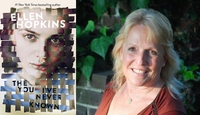Using free verse as her vehicle, Hopkins (Crank
, Glass
) takes readers on a harrowing ride into the psyches of 16-year-old identical twins Kaeleigh and Raeanne, both of whom are racing toward self-destruction. The girls' family appears picture-perfect. Their father is a prominent judge, their mother is running for Congress, and both girls do well in school. But ever since an accident, “Mom doesn't love anyone./ She is marble. Beautiful./ Frigid. Easily stained/ by her family. What's left/ of us, anyway. We are corpses.” Raeanne seeks escape in sex and drugs; Kaileigh binges and cuts herself. Brief, gutsy confessions reveal a history of sexual abuse and emotional neglect, and it's not clear that both girls will survive it. Hopkins's verse is not only lean and sinuous, it also demonstrates a mastery of technique. Strategically placed concrete verse includes a poem about revenge shaped like a double-edged sword; in another, about jealousy, the lines form one heart reflecting another, until a rupture breaks the symmetry at the bottom. Often, the twins' entries mirror each other, on facing pages: although used differently in the two poems, the same key words are set off in corresponding stanzas (“think./ How/ different/ life./ could be” reads one set of key words). Those for whom Uncle Vampire
means something will anticipate the still-breathless climax; all others, including most of the target audience, will be shocked. Ages 14–up. (Aug.)



